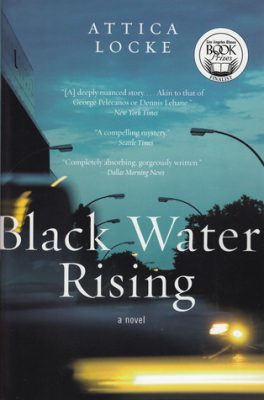 By Eisa Nefertari Ulen, published in The Defenders Online, December 8th, 2009
By Eisa Nefertari Ulen, published in The Defenders Online, December 8th, 2009
Attica Locke has added her name to the list of best black genre fiction with her debut thriller, Black Water Rising, acclaimed by many, from The New York Times to The Seattle Times, and named Booklist Best Debut Crime Novel of 2009.
A screenwriter and former Sundance Institute fellow, whose credits include Disney, Paramount and Twentieth Century Fox, Locke is the daughter of civil rights activists and is currently at work on an HBO miniseries about the movement. Those who are the offspring of civil rights and black power activists are, like Locke, often haunted by the ghosts of that era.
Some, like Fred Hampton, Jr., lost parents to the violence of the struggle itself, just as Locke’s main character, Jay Porter, loses his fictional father to southern racists. Others, like me, are haunted by the psychological and emotional harm complete participation in 1960s radical change had on our parents who did manage to survive.
Jay Porter must grapple with that interior damage, too. In this weighty page-turner, Jay, a struggling defense attorney, rides a rickety boat along a Houston, Texas bayou with his pregnant wife and the boat’s owner, a cousin of a brother from around the way. As they ride through the city’s gritty Fifth Ward, the three passengers hear gunshots, a splash, and the sure sound of trouble. Urged by his wife to rescue the woman in the water, Jay jumps into the muddy bayou—and into a muddy mess involving Houston’s political and business elite.
The obvious questions—who did it and why—drive the plot. Jay can’t let go of his encounter on the water, and a union strike, real estate schemes, an oil maven, a couple of prostitutes, the local paper, a black Ford, and a midnight beat-down keep the story moving. While Locke is astute at handling each plot point, Jay’s decisions, his responses to each revelation that inches him closer to solving the mystery on the bayou, give Black Water Rising its real heft.
Flashbacks, from Jay’s father’s death to his own youthful participation in the Student Nonviolent Coordinating Committee (SNCC) and pan-Africanism, explain the motivations of a man trapped in a mental prison constructed during his college years. Locke deftly identifies COINTELPRO as the warden Jay Porter must confront before he can liberate his own soul and survive to witness what his own father could not: the birth of his first child.
Despite the effects of government surveillance on Jay’s mental state, Locke does not let her protagonist completely off the hook. Jay Porter has been, in many ways, complicit in his own anguished oppression. He may have to face the demon of counter-intelligence, but Jay must also recognize that he has become his own jailer, the one too willing to pull the cell door closed whenever his wife, father-in-law, or a former comrade tries to help set him free.
Because it often presents the forces of good in conflict with the very bad, genre fiction lends itself to this type of exploration. While the struggle with social forces personified by greedy oil men and corrupt union officials makes Locke’s work a thriller, it is the nuanced and complex inner life of Jay Porter that elevates Black Water Rising to the level of achievement reached by detective writer Walter Mosley, speculative fiction writer Octavia Butler, and horror/supernatural writer Tananarive Due.
Like these and other African-American novelists, Locke explores themes of race and power. She has earned a place with her literary fore-parents because she is deftly astute at handling not only the good and the bad, but also the muddy middle we all ride in between.